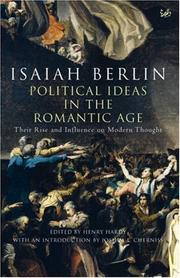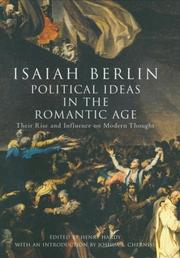| Listing 1 - 10 of 11 | << page >> |
Sort by
|
Book
ISBN: 9780199673261 Year: 2013 Volume: *109 Publisher: Oxford,
Abstract | Keywords | Export | Availability | Bookmark
 Loading...
Loading...Choose an application
- Reference Manager
- EndNote
- RefWorks (Direct export to RefWorks)
Book
ISBN: 9780691220949 9780691220949 Year: 2021 Publisher: Princeton, N.J. Princeton University Press
Abstract | Keywords | Export | Availability | Bookmark
 Loading...
Loading...Choose an application
- Reference Manager
- EndNote
- RefWorks (Direct export to RefWorks)
Book
ISBN: 9780691220932 Year: 2021 Publisher: Princeton, N.J. : Princeton University Press,
Abstract | Keywords | Export | Availability | Bookmark
 Loading...
Loading...Choose an application
- Reference Manager
- EndNote
- RefWorks (Direct export to RefWorks)
"A timely defense of liberalism that draws vital lessons from its greatest midcentury proponents. Today, liberalism faces threats from across the political spectrum. While right-wing populists and leftist purists righteously violate liberal norms, theorists of liberalism seem to have little to say. In Liberalism in Dark Times, Joshua Cherniss issues a rousing defense of the liberal tradition, drawing on a neglected strand of liberal thought.Assaults on liberalism-a political order characterized by limits on political power and respect for individual rights-are nothing new. Early in the twentieth century, democracy was under attack around the world, with one country after another succumbing to dictatorship. While many intellectuals dismissed liberalism as outdated, unrealistic, or unworthy, a handful of writers defended and reinvigorated the liberal ideal, including Max Weber, Raymond Aron, Albert Camus, Reinhold Niebuhr, and Isaiah Berlin-each of whom is given a compelling new assessment here.Building on the work of these thinkers, Cherniss urges us to imagine liberalism not as a set of policies but as a temperament or disposition-one marked by openness to complexity, willingness to acknowledge uncertainty, tolerance for difference, and resistance to ruthlessness. In the face of rising political fanaticism, he persuasively argues for the continuing importance of this liberal ethos"-- "Today, liberals face a predicament: how to defend liberal principles, when adherence to them seems to constitute a fatal disadvantage against unprincipled opponents. The challenge is not new. In the early years of the twentieth century, liberalism was attacked, by critics on both the right and, especially, the left for being hypocritical, naïve, irresponsible, and impotent. It couldn't, for example (anti-liberalists thought), address the acute inequality of imperial rule, racial segregation, and socio-economic poverty. These issues of social justice it was claimed by critics required a politics marked by an uncompromising commitment to ultimate ends, and an unrelenting use of power. Faced with such sentiments and the practical successes of anti-liberal ideologies (i.e. Fascism, Nazism, and Communism) liberals felt pressure to silence their scruples and doubts, and embrace the confidence, ruthlessness, and intransigence exhibited by their opponents. But doing so seemed tantamount to abandoning liberal hopes for, and commitments to, human freedom and all they valued in the first place. In Liberalism for Dark Times, Cherniss tells the story of the liberal response to this challenge in the twentieth century. Through a close study of five leading intellectuals engaged in these debates-Max Weber, Raymond Aron, Albert Camus, Reinhold Niebuhr, and Isaiah Berlin-Cherniss reconstructs a distinctive, neglected strand of liberal thought. This strand defines and defends liberalism as a political ethos: a complex of dispositions, temperament, and sensibility and style-which include skepticism; openness to experience; and careful, discriminating judgment-that shape how individuals make choices, meet challenges, understand and pursue possibilities, and conduct themselves toward others in the course of political struggle. In reconstructing the history of, what he calls, a tempered liberalism, and formulating it as a distinctive political perspective, Cherniss offers an alternative to the prevalent ways of thinking about both, liberalism's history and the intellectual resources available to it today"--
Liberalism --- Moral and ethical aspects. --- Philosophy --- History --- Berlin, Isaiah, --- Niebuhr, Reinhold, --- Camus, Albert, --- Aron, Raymond, --- Weber, Max, --- Political and social views.
Book
ISBN: 0191654159 1299476104 9780191654152 9780199673261 0199673268 Year: 2013 Publisher: Oxford Oxford University Press
Abstract | Keywords | Export | Availability | Bookmark
 Loading...
Loading...Choose an application
- Reference Manager
- EndNote
- RefWorks (Direct export to RefWorks)
A detailed study of Isaiah Berlin: historian, philosopher, and political theorist. Situates his evolving ideas in the context of British society and world politics. Offers a new interpretation of Berlin's influential writings on liberty and his debts to philosophy, and makes clear his relationship to the political debates of his times.
Liberalism --- Liberty. --- Philosophers --- Philosophy, Modern --- Political science --- Moral and ethical aspects. --- Philosophy. --- Philosophy --- History --- Berlin, Isaiah,
Digital
ISBN: 9780691220949 Year: 2021 Publisher: Princeton, N.J. Princeton University Press
Abstract | Keywords | Export | Availability | Bookmark
 Loading...
Loading...Choose an application
- Reference Manager
- EndNote
- RefWorks (Direct export to RefWorks)
Book
ISBN: 9780691217031 Year: 2021 Publisher: Princeton (N.J.),
Abstract | Keywords | Export | Availability | Bookmark
 Loading...
Loading...Choose an application
- Reference Manager
- EndNote
- RefWorks (Direct export to RefWorks)
Book
ISBN: 9781316503058 9781316481448 9781107138506 Year: 2018 Publisher: New York : Cambridge University Press,
Abstract | Keywords | Export | Availability | Bookmark
 Loading...
Loading...Choose an application
- Reference Manager
- EndNote
- RefWorks (Direct export to RefWorks)
Isaiah Berlin (1909-1997) was a central figure in twentieth-century political thought. This volume highlights Berlin's significance for contemporary readers, covering not only his writings on liberty and liberalism, the Enlightenment and Romanticism, Russian thinkers and pluralism, but also the implications of his thought for political theory, history, and the social sciences, as well as the ethical challenges confronting political actors, and the nature and importance of practical judgment for politics and scholarship. His name and work are inseparable from the revival of political philosophy and the analysis of political extremism and defense of democratic liberalism following World War II. Berlin was primarily an essayist who spoke through commentary on other authors and, while his own commitments and allegiances are clear enough, much in his thought remains controversial. Berlin's work constitutes an unsystematic and incomplete, but nevertheless sweeping and profound, defense of political, ethical, and intellectual humanism in an anti-humanistic age.

ISBN: 9781844139262 Year: 2007 Publisher: London Pimlico
Abstract | Keywords | Export | Availability | Bookmark
 Loading...
Loading...Choose an application
- Reference Manager
- EndNote
- RefWorks (Direct export to RefWorks)

ISBN: 0701179090 Year: 2006 Publisher: London Chatto & Windus
Abstract | Keywords | Export | Availability | Bookmark
 Loading...
Loading...Choose an application
- Reference Manager
- EndNote
- RefWorks (Direct export to RefWorks)
Book
ISBN: 9781400852819 Year: 2014 Publisher: Princeton, NJ
Abstract | Keywords | Export | Availability | Bookmark
 Loading...
Loading...Choose an application
- Reference Manager
- EndNote
- RefWorks (Direct export to RefWorks)
| Listing 1 - 10 of 11 | << page >> |
Sort by
|

 Search
Search Feedback
Feedback About UniCat
About UniCat  Help
Help News
News